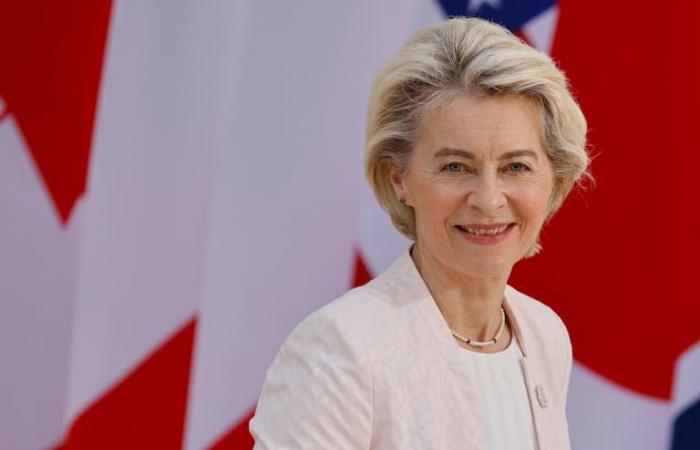Hear
PARIS.- Who will occupy the so-called “top jobs” of the European Union (EU)? The leaders of the 27 member countries will meet tonight in Brussels to begin the distribution of the main positions of responsibility of the institutions of the bloc for the next five years. In view of the results of the recent European parliamentary elections, the German Ursula von der Leyen seemed well placed to obtain a second term as president of the Commission.
This informal meeting is a first meeting for the heads of state and government of the EU nations after the European elections of June 6 to 9, marked by a noticeable advance of the extreme right in several countries, including France and Germany.
A European Council is scheduled for June 27 and 28, but a consensus already appears to exist on the bloc’s four top posts.
Von der Leyen She is very well placed to succeed herself, as a candidate for the European People’s Party (EPP), a political family that came first in the European elections, with 190 seats (+14) in the new Parliament. The designation of the 65-year-old German, member of the Christian Democratic Union (CDU), is however not automatic: Von der Leyen It needs to obtain a “qualified majority” of at least 15 countries, representing 65% of the European population.
Within the European Council, the EPP has a dozen leaders. Support from Emmanuel Macronin the camp of centrists and liberals, as well as Olaf Sholz, belonging to social democracy, is crucial.
For her part, the head of the Italian government, Giorgia Meloni, arrival of the post-fascist extreme right, could have an interest in not speaking out quickly and waiting for the formation of the groups in the European Parliament, in order to negotiate positions for their group. His strength of European Conservatives and Reformists (ECR) obtained 76 seatsalthough it could see its ranks increased by a certain number of the 90 MEPs who are currently among the “non-registered”.
If it were indeed confirmed by the leaders, Von der Leyen must then be ratified by an absolute majority of 361 MEPs.
The current president of the European Council – in charge of organizing and directing the summits of the leaders of the member countries –, the Belgian Charles Michelwho maintains difficult relations with Von der Leyen, will leave his duties. The Social Democrats, who constitute the second political group in the European Parliament, want that position for the former Portuguese premier Antonio Costa. The 62-year-old socialist was the subject of an investigation for influence peddling that led to his resignation from the government in November. But European diplomatic sources affirm that this will not be an insurmountable obstacle, because the suspicions that weigh on him seem to dissipate.
Also under discussion is the position of high representative for Foreign Relations of the bloc. At 77 years of age, its current manager, the Spanish Josep Borrell, retires. The favorite to replace him is the Estonian prime minister Kaja Kallas. This 46-year-old liberal would be the only Eastern European among the “top jobs” holders. Kallas became known for its unfailing support for Ukraine in the war launched by Russia, Estonia’s border country.
Finally, in the presidency of the European Parliament since January 2022, the Maltese Roberta Metsola (EPP), 45 years old, should – barring a last-minute surprise – obtain a new two-and-a-half-year term.
The unusual speed with which the consensus seems to have formed around these four names responds – according to sources in Brussels – to the meticulous preparation of Von der Leyen’s campaign and her desire not to let the extreme right alter the European chessboard. “Von der Leyen, whom no one expected in 2019, did not leave any space to chance. Throughout the campaign she was the only credible candidate for the presidency of the European Commission during the debates organized at the European level,” analyzes Jean-Dominique Giuliani, president of the Robert Schuman Foundation.


